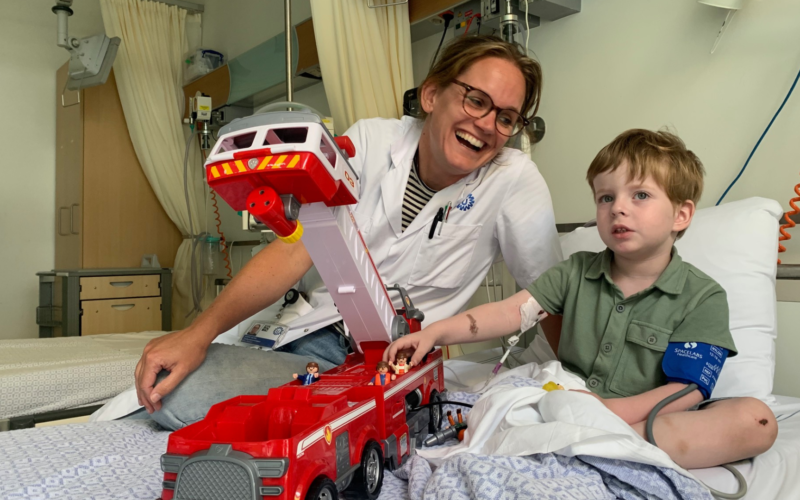4-year-old Bjorn seems like a healthy and happy little boy, but he has MMA. A serious metabolic disease in which he cannot break down proteins properly. This can cause damage to the kidneys, eyes and brain. Bjorn is the second Dutch patient to take part in an innovative clinical trial at the Wilhelmina Children’s Hospital in Utrecht. Paediatrician in metabolic diseases Sabine Fuchs: “He receives ten infusions of fat globules containing the mRNA of the enzyme he needs. Thereby, the research nurses of the 030 Lab and doctors monitor him closely, in connection with possible side effects.”
Added value of therapy
Administration of this enzyme may prevent Bjorn from deteriorating physically. The therapy offers a temporary solution. It does not cure the disease, but it may slow down the process of deterioration. For father Olaf and mother Patricia, the news that Bjorn was eligible to participate in the trial was really something very special. We were hoping for it, but we didn’t expect Bjorn to get this opportunity at this stage. He is the 11th patient in the world to be allowed to participate!”
Recognising symptoms
“It gives Bjorn more time,” says Olaf. “And it also gives the researchers more time to investigate how to cure this disease in the meantime.” Patricia and Olaf’s lives changed dramatically when their newborn son deteriorated rapidly without them knowing what was wrong with him. Until Peter van Hasselt, paediatrician and subhead of Metabolic Diseases, recognised the symptoms of MMA. “He was taken by ambulance to the ICU at the Wilhelmina Children’s Hospital in Utrecht,” says father Olaf. “There he underwent drastic treatments, such as dialysis to purify his blood to survive, while the doctors involved worked against the clock. That they were able to act quickly saved Bjorn’s life.”
The disease greatly affects the daily life of the whole family. Olaf: “Bjorn needs to ingest an exact amount of protein per day to limit the physical damage caused by his disease. When Bjorn ingests more protein at dinner than the exact amount he needs to grow, his body cannot regulate it. Some components of those proteins he cannot break down and those are converted into toxins, which can damage his organs.”
Working together
Bjorn is dealing with the effects of his illness, but also goes through all the ordinary things in everyday life. “Something like an ordinary stomach flu has a huge impact on him. As parents, we are constantly on because ordinary things can have much more serious consequences,” says Olaf. “As parents, we learned to look very carefully at our child, trust our judgement and then discuss with Klaas Koop – his paediatric metabolic disease doctor – what we see and notice about Bjorn. ‘We learned to back up our judgements.'” Whereas other children of working parents attend a regular nursery, this was not possible for Bjorn because he is tube-fed. And as a 4-year-old, starting at a regular school was also complicated. “Bjorn went through many hospitalisations in the first years of his life, which makes him a bit later in some respects, for example he is not yet fully potty-trained and also develops a bit slower in terms of mobility. Yet he also manages a lot and we are so proud of him!” Bjorn receives ten infusions of fat globules containing the mRNA of the enzyme he needs. The research nurses at the 030 Lab and doctors are monitoring him closely and if Bjorn benefits, the therapy will continue. Even when the trial is completed. “This therapy so far increases his quality of life,” says Olaf. “It may mean that we regularly spend a morning in the WKZ with Bjorn, but then get round to doing something fun together. New perspective and new energy emerge.”
“We strive for a healthy future for Bjorn and all other MMA patients. We are committed to that every day.”
Research aimed at the future
Sabine Fuchs: “I want to use the same technique for my research in the future: giving mRNA in fat globules in the blood so that the mRNA is expressed in the liver. But I want to give mRNA with the tools to correct the error in the dna. With gene correction via mRNA in fat globules, I hope to really cure the patients. This is because we think that all damage comes from the toxic substances made in the liver – so if we correct the liver, we cure the patient. That only needs to be done once and then the DNA is repaired and the cell is cured.”
The future is uncertain for Bjorn and other MMA patients. Sabine Fuchs: “MMA patients sometimes face kidney deterioration, blindness, dysregulation during illness and neurological damage. To prevent that, we can give a liver transplant, but that is a major procedure, with yet other complications and disadvantages. We strive for a healthy future for Bjorn and all other MMA patients. We are committed to that every day. “

